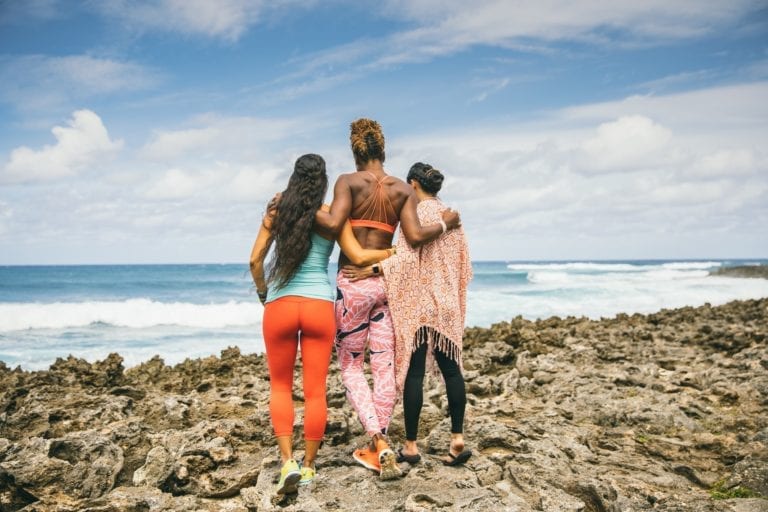
Tune in with Mark Groves at Wanderlust Seattle! For tickets and more information, click here. We believe wellness should be accessible for all—scholarships are available for all our events.
In the age of technology, the idea of connection is a tricky concept. It can seem as if we’re plugged in all the time; it’s difficult to even walk down the street without bumping into someone burrowed in a handheld screen. Moments when we’re not digitally connected can be anxiety-inducing and stressful—have you ever panicked when the wifi was weak? Yeah. Most of us have been there.
But is being plugged in different than connection? According to Human Connection Specialist (writer, speaker, relationship coach) Mark Groves, it absolutely is. I recently started dating a guy who doesn’t use any social media—and at first, the struggle was real. How was I supposed to figure out who he was? What kind of a nascent relationship doesn’t build foundations for inside jokes on private Instagram messages and @tags? A healthy one, it turns out. Our relationship has been developing without an incessant digital hum in the background; our dates aren’t cluttered with references to memes or random accounts. We only exist in the real here and now.
According to Groves, this is the name of the relationship game. That’s not to say that our iEverything is all bad: “Technological connection is great in the sense that we have far more access to information,” he says. “Where we were once prisoners of our geography that limited our access, seldom having the opportunity or even desire to challenge our beliefs and how we saw the world,” says Groves, we can now “find our own tribe that shares similar thoughts, feelings, and passions.”
The trouble is that our brains have not necessarily evolved on par with the pace of technology, meaning it can be a challenge to mentally separate the digital world from the real world. Just how big of an issue is this? According to the US National Library of Medicine and the National Institutes of Health, surveys in the US and Europe have identified that up to 8 percent of the population may suffer from Internet Addictive Disorder. Indeed, says Groves, “We chase highs through likes and build online personas that sell out ourselves, our sexuality, and our bodies—all for the desire for acceptance and love from our digital tribe. Our dopamine receptors get flooded every time we login,” he says.
We chase highs through likes—all for the desire for acceptance and love from our digital tribe.
The falsity of technological connection manifests on a tangible level as well: humans require touch. Physical touch. Good old-fashioned petting, rubbing, stroking, massaging. “We’re meant to share cellular space with others,” says Groves. “Love will never move from heartbeats to 1s and 0s.”
It’s not as if relying on the love and acceptance of our peers and community is anything new. Humans have always—and not necessarily healthily—tended to gauge self-worth on the acceptance of peers and the presence of relationships. Yet Groves believes social media has taken this dysfunction to a new level.
“When our self-worth is determined outside of our ourselves, we lose ourselves,” he says. “This is why cultivating a relationship with ourselves is so damn important.”

Finding Fulfillment Within
Developing an inner sense of self-worth allows us the freedom of not relying on someone else to make us happy. Our feelings—rather than reactions to other people’s perceptions or perceived perceptions—become cultivated and resonate emotions. In turn, we do people around us a favor as well. “We take the responsibility off our partners (and others) for determining how we feel about us, and that frees them to just loves us,” says Groves.
OK, yes. So putting down the phone and backing away from the screen is good for developing a sense of self-worth that isn’t contingent on the validation of others. But it’s more than self-esteem. When we unplug from the devices that have become ubiquitous in modern life, we are able to truly plug into our most authentic selves. In doing this, we’re able to recognize the patterns in our lives that may be holding us back.
“Everything is patterns,” says Groves. “Symmetry and symbiosis are the foundation of our world… It’s how cells work. It’s also how humans work.” He gives the example of growing up in a difficult household, in which conflict was never resolved with intimacy. If these are the only patterns a child grows up with, how would that adult know any differently?
As such, according to Groves, so-called emotional triggers are actually invitations toward healing. “If someone triggers you, get curious,” he says. “The pattern that is challenging us the invitation for mastery.” That is: We have the power to heal our emotional scars—triggers are opportunities to look closely at stale patterns that are causing us pain. But we’re never able to get to that place if we do not know ourselves, if we haven’t given ourselves the space, time, and effort to create, evolve, and grow.
When enjoyed without relying on them for self-worth, relationships can be great vehicles for personal growth, says Groves, but “if we don’t stay present to who we are, we can lose ourselves again at any moment.” Though the journey back to ourselves will likely be quicker and easier each time we do it—Groves believes the journey of losing ourselves and finding ourselves again and again is ultimately what life is all about—it’s important to take that journey with the authenticity and integrity inspired when we dig deep. This allows us to realize who we are and where we can go: “not the version of us we were taught to be,” says Groves, “but our true essence that is literally dying to be expressed from our heart and souls.”
Again, hearts and souls do not beat in 1s and 0s. So while I’ll keep my social media accounts open, I’m going to take a cue from my new beau. Life is just a lot nicer when you’ve tuned out the chatter of the digital world, and tuned into your truest self.
—
 Lisette Cheresson is a writer, yoga teacher, and adventuress who is an avid vagabond, dirt-collector, and energy-practitioner. When she’s not attempting to create pretty sentences or reading pretty sentences other people have created, it’s a safe bet that she’s either hopping a plane, dancing, cooking, or hiking. She is currently the Director of Digital Community at Wanderlust Festival.
Lisette Cheresson is a writer, yoga teacher, and adventuress who is an avid vagabond, dirt-collector, and energy-practitioner. When she’s not attempting to create pretty sentences or reading pretty sentences other people have created, it’s a safe bet that she’s either hopping a plane, dancing, cooking, or hiking. She is currently the Director of Digital Community at Wanderlust Festival.